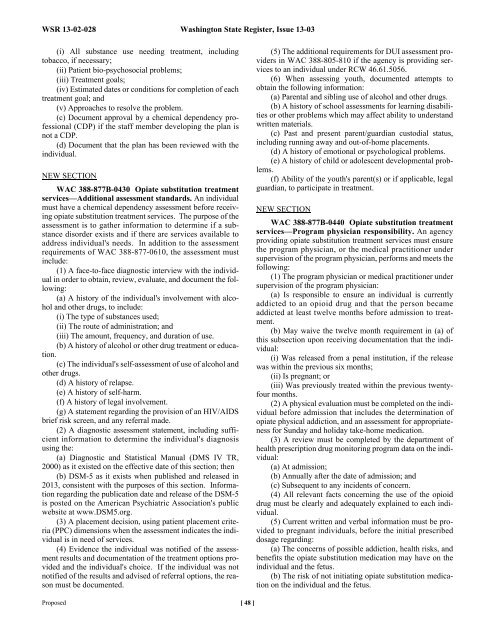Proposed
Proposed
Proposed
Create successful ePaper yourself
Turn your PDF publications into a flip-book with our unique Google optimized e-Paper software.
WSR 13-02-028 Washington State Register, Issue 13-03<br />
(i) All substance use needing treatment, including<br />
tobacco, if necessary;<br />
(ii) Patient bio-psychosocial problems;<br />
(iii) Treatment goals;<br />
(iv) Estimated dates or conditions for completion of each<br />
treatment goal; and<br />
(v) Approaches to resolve the problem.<br />
(c) Document approval by a chemical dependency professional<br />
(CDP) if the staff member developing the plan is<br />
not a CDP.<br />
(d) Document that the plan has been reviewed with the<br />
individual.<br />
NEW SECTION<br />
WAC 388-877B-0430 Opiate substitution treatment<br />
services—Additional assessment standards. An individual<br />
must have a chemical dependency assessment before receiving<br />
opiate substitution treatment services. The purpose of the<br />
assessment is to gather information to determine if a substance<br />
disorder exists and if there are services available to<br />
address individual's needs. In addition to the assessment<br />
requirements of WAC 388-877-0610, the assessment must<br />
include:<br />
(1) A face-to-face diagnostic interview with the individual<br />
in order to obtain, review, evaluate, and document the following:<br />
(a) A history of the individual's involvement with alcohol<br />
and other drugs, to include:<br />
(i) The type of substances used;<br />
(ii) The route of administration; and<br />
(iii) The amount, frequency, and duration of use.<br />
(b) A history of alcohol or other drug treatment or education.<br />
(c) The individual's self-assessment of use of alcohol and<br />
other drugs.<br />
(d) A history of relapse.<br />
(e) A history of self-harm.<br />
(f) A history of legal involvement.<br />
(g) A statement regarding the provision of an HIV/AIDS<br />
brief risk screen, and any referral made.<br />
(2) A diagnostic assessment statement, including sufficient<br />
information to determine the individual's diagnosis<br />
using the:<br />
(a) Diagnostic and Statistical Manual (DMS IV TR,<br />
2000) as it existed on the effective date of this section; then<br />
(b) DSM-5 as it exists when published and released in<br />
2013, consistent with the purposes of this section. Information<br />
regarding the publication date and release of the DSM-5<br />
is posted on the American Psychiatric Association's public<br />
website at www.DSM5.org.<br />
(3) A placement decision, using patient placement criteria<br />
(PPC) dimensions when the assessment indicates the individual<br />
is in need of services.<br />
(4) Evidence the individual was notified of the assessment<br />
results and documentation of the treatment options provided<br />
and the individual's choice. If the individual was not<br />
notified of the results and advised of referral options, the reason<br />
must be documented.<br />
<strong>Proposed</strong> [ 48 ]<br />
(5) The additional requirements for DUI assessment providers<br />
in WAC 388-805-810 if the agency is providing services<br />
to an individual under RCW 46.61.5056.<br />
(6) When assessing youth, documented attempts to<br />
obtain the following information:<br />
(a) Parental and sibling use of alcohol and other drugs.<br />
(b) A history of school assessments for learning disabilities<br />
or other problems which may affect ability to understand<br />
written materials.<br />
(c) Past and present parent/guardian custodial status,<br />
including running away and out-of-home placements.<br />
(d) A history of emotional or psychological problems.<br />
(e) A history of child or adolescent developmental problems.<br />
(f) Ability of the youth's parent(s) or if applicable, legal<br />
guardian, to participate in treatment.<br />
NEW SECTION<br />
WAC 388-877B-0440 Opiate substitution treatment<br />
services—Program physician responsibility. An agency<br />
providing opiate substitution treatment services must ensure<br />
the program physician, or the medical practitioner under<br />
supervision of the program physician, performs and meets the<br />
following:<br />
(1) The program physician or medical practitioner under<br />
supervision of the program physician:<br />
(a) Is responsible to ensure an individual is currently<br />
addicted to an opioid drug and that the person became<br />
addicted at least twelve months before admission to treatment.<br />
(b) May waive the twelve month requirement in (a) of<br />
this subsection upon receiving documentation that the individual:<br />
(i) Was released from a penal institution, if the release<br />
was within the previous six months;<br />
(ii) Is pregnant; or<br />
(iii) Was previously treated within the previous twentyfour<br />
months.<br />
(2) A physical evaluation must be completed on the individual<br />
before admission that includes the determination of<br />
opiate physical addiction, and an assessment for appropriateness<br />
for Sunday and holiday take-home medication.<br />
(3) A review must be completed by the department of<br />
health prescription drug monitoring program data on the individual:<br />
(a) At admission;<br />
(b) Annually after the date of admission; and<br />
(c) Subsequent to any incidents of concern.<br />
(4) All relevant facts concerning the use of the opioid<br />
drug must be clearly and adequately explained to each individual.<br />
(5) Current written and verbal information must be provided<br />
to pregnant individuals, before the initial prescribed<br />
dosage regarding:<br />
(a) The concerns of possible addiction, health risks, and<br />
benefits the opiate substitution medication may have on the<br />
individual and the fetus.<br />
(b) The risk of not initiating opiate substitution medication<br />
on the individual and the fetus.
















